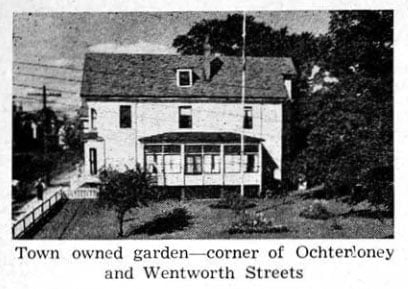From The Story of Dartmouth, by John P. Martin:
The Dartmouth Patriot newspaper removed from 85 Portland Street in 1912, and located at the present 48 Commercial Street in the building then vacated by C. E. Peveril when he closed out his 20-year old butcher business. John E. Walker also abandoned his father’s grocery establishment which had been started many years before by H. C. Walker at the present premises of E. S. Dickie on Portland Street.
Construction work in 1912 included rebuilding of the Sugar Refinery where 400 men were employed. Remodeling of the Baptist Church on King Street comprised a new vestry and Sunday School section. Their first parsonage was also built as a dwelling at northwest corner of Tulip and Pine Streets. Another house was erected at the northwest corner of Tulip and Maple; and a few more Ropework cottages were built on Dawson Street. Contractor Charles Short erected for his father-in-law Edward Stanley, the double dwelling at 26-28 King Street. Otherwise there was not much new work in the building line, probably on account of the large number of older houses already up for sale or to be let.
The Dartmouth Development Company bought up a few properties in downtown Dartmouth. Many others were on the market. Mrs. John Hunt, widow of the iceman, who then occupied Manor Hill, offered the residence, stable, coach house and nearly 40 acres of land, both adjacent and in the vicinity of Oathill Lake.
At 29 King Street that year, died Mrs. Thomas Hill, last of the family of Judge Charles R. Fairbanks, Canal Secretary. Paul Farrell, brother of Dominick and native of Dartmouth, whose former grocery and bar still stands at 66 Ochterloney Street, died at Halifax aged 86. Mrs. Farrell’s flower garden flourished on the present location of Masonic Hall, and on part of Wentworth Street.

